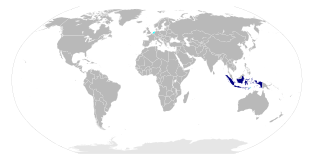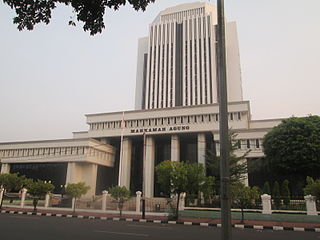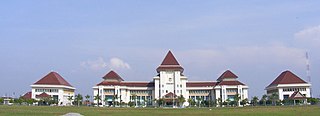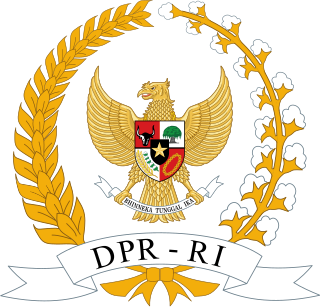Related Research Articles

United States appellate procedure involves the rules and regulations for filing appeals in state courts and federal courts. The nature of an appeal can vary greatly depending on the type of case and the rules of the court in the jurisdiction where the case was prosecuted. There are many types of standard of review for appeals, such as de novo and abuse of discretion. However, most appeals begin when a party files a petition for review to a higher court for the purpose of overturning the lower court's decision.

The Indonesian National Armed Forces are the military forces of the Republic of Indonesia. It consists of the Army (TNI-AD), Navy (TNI-AL), and Air Force (TNI-AU). The President of Indonesia is the Supreme Commander of the Armed Forces. As of 2023, it comprises approximately 400,000 military personnel including the Indonesian Marine Corps, which is a branch of the Navy.

Indonesian is the official and national language of Indonesia. It is a standardized variety of Malay, an Austronesian language that has been used as a lingua franca in the multilingual Indonesian archipelago for centuries. With over 280 million inhabitants, Indonesia ranks as the fourth most populous nation globally. According to the 2020 census, over 97% of Indonesians are fluent in Indonesian, making it the largest language by number of speakers in Southeast Asia and one of the most widely spoken languages in the world. Indonesian vocabulary has been influenced by various regional languages such as Javanese, Sundanese, Minangkabau, Balinese, Banjarese, and Buginese, as well as by foreign languages such as Arabic, Dutch, Portuguese, and English. Many borrowed words have been adapted to fit the phonetic and grammatical rules of Indonesian, enriching the language and reflecting Indonesia's diverse linguistic heritage.

The Special Region of Yogyakarta is a province-level special region of Indonesia in southern Java. It is a semi-enclave that is surrounded by on the landward side by Central Java Province to the west, north, and east, but has a long coastline on the Indian Ocean to the south.
Batson v. Kentucky, 476 U.S. 79 (1986), was a landmark decision of the United States Supreme Court ruling that a prosecutor's use of a peremptory challenge in a criminal case—the dismissal of jurors without stating a valid cause for doing so—may not be used to exclude jurors based solely on their race. The Court ruled that this practice violated the Equal Protection Clause of the Fourteenth Amendment. The case gave rise to the term Batson challenge, an objection to a peremptory challenge based on the standard established by the Supreme Court's decision in this case. Subsequent jurisprudence has resulted in the extension of Batson to civil cases and cases where jurors are excluded on the basis of sex.

The Agency for Language Development and Cultivation, formerly the Language and Book Development Agency and the Language Centre, is the institution responsible for standardising and regulating the Indonesian language as well as maintaining the indigenous languages of Indonesia. It is an agency under the Ministry of Education, Culture, Research and Technology of Indonesia.

The Supreme Court of the Republic of Indonesia is the independent judicial arm of the state. It maintains a system of courts and sits above the other courts and is the final court of appeal. It can also re-examine cases if new evidence emerges.

The Judiciary of Indonesia constitutionally consists of the Supreme Court of Indonesia, the Constitutional Court of Indonesia, and the lesser court system under the Supreme Court. These lesser courts are categorically subdivided into the public courts, religious courts, state administrative courts, and military courts.
The Simeulue language is spoken by the Simeulue people of Simeulue off the western coast of Sumatra, Indonesia.
Hollingsworth v. Perry was a series of United States federal court cases that re-legalized same-sex marriage in the state of California. The case began in 2009 in the U.S. District Court for the Northern District of California, which found that banning same-sex marriage violates equal protection under the law. This decision overturned California ballot initiative Proposition 8, which had banned same-sex marriage. After the State of California refused to defend Proposition 8, the official sponsors of Proposition 8 intervened and appealed to the Supreme Court. The case was litigated during the governorships of both Arnold Schwarzenegger and Jerry Brown, and was thus known as Perry v. Schwarzenegger and Perry v. Brown, respectively. As Hollingsworth v. Perry, it eventually reached the United States Supreme Court, which held that, in line with prior precedent, the official sponsors of a ballot initiative measure did not have Article III standing to appeal an adverse federal court ruling when the state refused to do so.

Cikarang is a large industrial, commercial and residential town which includes the administrative headquarters of Bekasi Regency, West Java, Indonesia. The biggest industrial estate in Southeast Asia, Kota Jababeka is located there.
Pakpak, or Batak Dairi, is an Austronesian language of Sumatra. It is spoken in Dairi Regency, Pakpak Bharat Regency, Parlilitan district of Humbang Hasundutan Regency, Manduamas district of Central Tapanuli Regency, and Subulussalam and Aceh Singkil Regency.

Darah dan Doa is a 1950 Indonesian war film directed and produced by Usmar Ismail, telling the story of the Siliwangi Division and its leader Captain Sudarto on a march to West Java. Following Ismail's Dutch-produced Tjitra (1949), Darah dan Doa is often cited as the first 'Indonesian' film, and the film's first day of shooting – 30 March – is celebrated in Indonesia as National Film Day.

Latta v. Otter is a case initiated in 2013 in U.S. federal court by plaintiffs seeking to prevent the state of Idaho from enforcing its ban on same-sex marriage. The plaintiffs won in U.S. District Court. The case was appealed to the Ninth Circuit Court of Appeals, which heard this together with two related cases–Jackson v. Abercrombie, and Sevcik v. Sandoval.

The Attorney General's Office of the Republic of Indonesia is the competent authority to advise the Government of Indonesia on matters of law. It serves as the central organization for the Indonesian Public Prosecution Service. The Attorney General's Office is seated in the national capital Jakarta.

The Speaker of the House of Representatives, is the presiding officer of the House of Representatives of Indonesia. The speaker is the political and parliamentary leader of the House of Representatives and is simultaneously the Council's presiding officer. The speakers also perform various other administrative and procedural functions.

The COVID-19 vaccination in Indonesia is an ongoing mass immunization in response to the COVID-19 pandemic in Indonesia. On 13 January 2021, the program commenced when President Joko Widodo was vaccinated at the presidential palace. In terms of total doses given, Indonesia ranks third in Asia and fifth in the world.
The People's Consultative Assembly, the bicameral legislature of Indonesia, passed a series of resolutions of the People's Consultative Assembly or TAP MPR throughout the 1960s, to the very last issued in 2003.
References
- ↑ Pusat Bahasa Kemendiknas RI (2008). "Pidana" (in Indonesian). bahasa.kemdiknas.go.id. Archived from the original on 27 May 2014. Retrieved 15 May 2014.
- 1 2 3 M. Yahya Harahap (2008). "Upaya Hukum Luar Biasa". Pembahasan Permasalahan dan Penerapan KUHAP (Pemeriksaan Sidang Pengadilan, Banding, Kasasi, dan Peninjauan Kembali) (in Indonesian). Jakarta: Sinar Grafika. pp. 607, 614. ISBN 979-8767-72-1.
- ↑ Pusat Bahasa Kemendiknas RI (2008). "Dakwa" (in Indonesian). bahasa.kemdiknas.go.id. Archived from the original on 27 May 2014. Retrieved 15 May 2014.